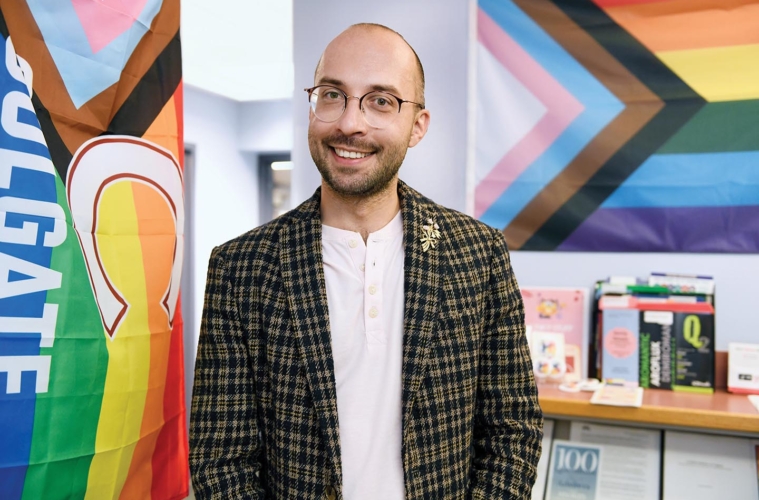Originally from Russia, Lyosha Gorshkov holds a PhD in political science from Perm State University (Russia). In 2014, Gorshkov was forced to leave Russia after being persecuted as an openly queer professor and advocate for LGBTQIA+ rights. Prior to coming to Colgate, Gorshkov served as a tenured faculty member at Perm State University; care manager at the Alliance for Positive Change (New York); visiting scholar at Indiana University (Bloomington); and assistant director of Pride Center and Women’s Center at Slippery Rock University (Pennsylvania).
Colgate Magazine: Since you arrived at Colgate, you have injected a lot of energy into the LGBTQ+ office and into the community. Tell us about your programming and where you get your ideas.
Lyosha Gorshkov: I get my ideas from working with students directly. It’s crucial for me to ask them to generate ideas and events that are applicable to them. That’s how we came up with the trans-wellbeing panels. We also did the first Pride walk in March 2022. There was a lot of support from across campus. Students were leaning out their windows and cheering. We’re trying to make all of our initiatives for everyone, regardless of identity. For example, the drag show, some people might think, why drag? But if you think about it, art is a creative form to build alliances. It’s not just an LGBTQ+-focused event. Students who might never think they would go
to something like this come, and they feel at ease, and they have fun. We’ve also done some concerts. That’s part of the entertainment aspect of programming, which is important because it can unite people regardless of their identities. But we also want people to be comfortable with sex and sexuality, and that’s why we launched the Sex Museum. We work with the Shaw Wellness Institute, Haven, Integrated Health Services, and student organizations to focus the Sex Museum on a different topic each semester. It’s part of a continuous effort to help students feel comfortable with their bodies and with the bodies of others.
CM: How have you been working with campus partners?
LG: I’ve been developing a relationship with athletics; I go to all the games. It’s a way to show support and raise visibility, and maybe I can inspire student- athletes who might be struggling or questioning. If you think strategically, you may change someone’s life just by being there. I’ve also been working with Greek life organizations. Several of them have asked me to do workshops with them to help disrupt stereotypes. I work with Haven Sexual Violence Resource Center, the Office of the Chaplains, and the Department of Campus Safety. It’s a work in progress, nothing can be changed overnight, but we’re taking very meaningful steps.
CM: Tell us more about the Rainbow Room.
LG: The Rainbow Room has been around roughly 20 years. Before, it was like a secret society, and only people who had the punch code could access it. It was intended as a confidential, safe space for LGBTQ+ students. My intention when I was hired was to make the Rainbow Room open and visible on campus. Now we have events and gatherings there, and it’s accessible not only to LGBTQ+-identified students, but to allies as well.
CM: What made you choose to work at Colgate?
LG: I love the people and the relationships. Also, I think Colgate is a very mission-driven institution — the Third-Century Plan really resonates with me. I feel like there’s an opportunity to make a difference here. And I love the natural landscape of the campus, it’s a bit like a fairy tale.

